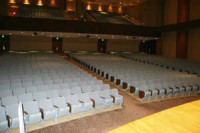
by Claire DeRoin– Some students’ finals consist of huge thesis papers or video projects, maybe an advertising campaign or photo series. But for Morningside’s music students, their final requirements for graduation are drastically different. While most people choose to sing in the car or shower where no one can hear them, music students are counting on their musical abilities to get them a diploma.
Haley Gabriel has been through the music recital hoops before. Last year, she donned a black gown and sang arias to a small audience in Eppley Auditorium. She received more than one bouquet of flowers afterward.
Joining her was Joel Dorsett, also a junior at the time. As juniors are only required to perform a half-recital, they teamed up to provide an entire recital experience for their audience.
Dorsett played a few pieces on the trumpet during the recital. “It’s a lot easier to have a recital when you are collaborating with another performer,” Dorsett explained. He sees his junior recital as a great learning experience. “The audience is there to support you,” he offered as advice. “Don’t worry about missing a note or two. It’s all about you, the performer.”
Now, Gabriel and Dorsett are both seniors and facing crunch time before their senior recitals—the last hurdle for music majors.
FEBRUARY
“I have to memorize three or four songs a week for the next four weeks,” Haley Gabriel exclaimed. “But it’s gonna happen!”
Back in February, when Gabriel’s senior music recital was two months away, she was already beginning to feel the pressure. Besides rehearsing, she had already drawn up invitations, shopped for and purchased a dress, and planned a small reception for after the recital.
Yet working ahead worked out to her disadvantage. The college announced at the end of February that Eppley Auditorium would be under renovation beginning April 1st. The auditorium will undergo asbestos abatement as well as remodeling. According to Music Department Chair Dr. Dooley, the auditorium will also get new flooring, seating, curtains on the stage, and curtains on the walls. “It’ll be a completely different space. Same size and shape, but it’ll look different,” she said.
“Why couldn’t they have waited one week,” Gabriel lamented as she corrected her invitations, writing “May be held at Grace Methodist, just up the hill” on the back of every one.
Dorsett’s recital was going to take place in Eppley, as well. The renovation meant finding a new venue and postponing the entire event. His recital is now slated for April 27th with St.
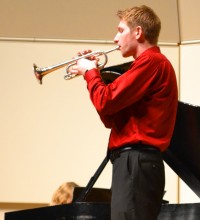
Thomas Episcopal Church on Douglas Street downtown as his new venue.
The search was a headache. “We had to go find a suitable venue that was available that wasn’t already booked and that had the capabilities to host a recital,” he said. “It will be more of a problem, because not everyone will know where that location is, exactly,” Dorsett said. He foresees himself giving directions all morning that day.
Besides inconvenience, Dorsett is disappointed that his last big recital at Morningside can’t be held in Eppley, calling it “difficult” to face.
“Eppley is a great place to have a recital. The auditorium has great acoustics and it has a great atmosphere,” he said.
But now that a new venue has been found, Dorsett has other things to focus on.
“I practice two hours a day, outside of one and a half to two and a half hours of rehearsal each day. I usually take a day off on the weekend,” he said. That’s at least twenty hours of practicing a week.
With music being such a big part of his life, Dorsett has accepted the long hours of practice. After graduation, he plans on joining a military band for a few years. After that? “Deciding if I want to go back to college or pursue a performing career,” Dorsett said.
“I just plan on playing the trumpet. I mean, if an opportunity comes up for me to sing, I would totally be down with that, but my primary focus is the trumpet.”
REQUIREMENTS
The requirements for each of Morningside’s three different music degrees vary significantly. The college offers a B.A., a performance degree, and a music education degree. In addition to chairing the music department, Dr. Dooley is a music professor and private voice teacher for the college. She broke down the degrees for easy explanation. The B.A. has the fewest required credit hours, but is still a combination of applied lessons, classes, and ensembles. The performance degree is much more specialized, and the music education degree is the largest of the three, because it includes pedagogy and general education classes in addition to regular music classes.
Not all music students are required to perform a recital, but for those that must, it is quite the undertaking.
“A recital is an opportunity for a student to show what they’ve accomplished in their applied students for four years at the college level,” Dr. Dooley explained. “The program will have a variety of repertoire showing their skills in different musical periods. They can show that they can play baroque, classical, romantic, and contemporary styles. Singers have to show a wide variety of languages. They’ll sing in English, French, German, Italian, Spanish.”
It varies from studio to studio, but sometimes students have the ability to choose their own music. For example, in Dr. Dooley’s studio, “We very often will use repertoire they’ve studied in previous years,” she said. “There might be a song they’ve done in their sophomore or junior year that they really, really love. We’ll take that one and build a group of songs around it.” That way, the students get to perform their favorite songs while learning new songs.
Instrumental and vocal recitals vary in musical selections. Dr. Dooley explained that instrumentalists like Dorsett more often perform large works like multi-movement concertos or sonatas, where singers perform many individual songs. Sometimes those songs will be from the same song cycle.
It’s not unheard of for other students and performers to perform as guest performers. Duets, small ensembles, and even scenes from musical theatre have been included in students’ recitals before.
“Doing collaborative music with a peer instead of always collaborating with a professional, which makes it seem like a student-teacher relationship, helps to develop independent musicianship skills,” Dr. Dooley said.
In addition to just rehearsing and performing music, musicians must also write to prepare.
Students write at least a paragraph about each piece on the recital program. This isn’t for the benefit of the performer, but the audience.
This way, Dr. Dooley said “a lay person knowing nothing about music or that repertoire can know a little bit about what to expect.”
She gave the example of a song that may contain lyrics about a horse, and the piano playing something that sounds like a horse. “You have to say that in your program notes so an audience member can look for that in the song.”
If Dr. Dooley could give one piece of advice to students on planning their recitals, it’d be to do it early. “That’s it,” she laughed. “Do it early.”
GETTING CLOSER — MARCH
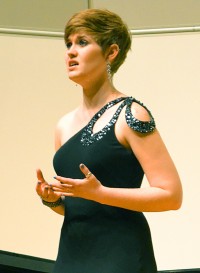
While most Morningside students got to go on vacation or go home during the week-long spring break, members of the Morningside College Choir, including Gabriel and Dorsett, spent their time hopping from town to town in Iowa, traveling and singing at high schools during the day and performing a full concert every night. This year’s choir tour took place in the Midwest, but in the past few years, they went to Italy and New York City.
“I can feel my tonsils touching,” Gabriel commented in a raspy voice upon returning to campus. “I had to memorize three songs during choir tour, and they all have to be memorized by my pre-hearing.”
Pre-hearings are like auditions in which performers have to prove that they have been preparing and rehearsing for their recitals.
A few weeks later, the day before Gabriel’s pre-hearing, she was busy with the College Choir. The group performed at a local church service and then performed a concert on campus.
Gabriel didn’t look outwardly nervous about the impending pre-hearing. “The good thing,” she said, “is that they scheduled my pre-hearing for ten in the morning. I have class at 9:15… so no class Monday morning!”
When such a large event is looming, it’s best to find joy in the little things in order to avoid stress.
T-MINUS TWO WEEKS: THE FINAL COUNTDOWN
Gabriel sat in the Spoonholder café sipping a hot tea. “I passed my pre-hearing, tentatively.”
Pre-hearings consist of both performing recital music and turning in programs complete with program notes. Gabriel mistakenly thought her voice instructor was bringing the notes. She was wrong. The panel of judges, all music department professors or administrators, gave Gabriel one week to turn in her materials.
That wasn’t a problem for Gabriel. “They’ll be turned in by the morning,” she said. The worst part for Gabriel now? “I can’t drink coffee until after my recital.”
Dorsett is still awaiting and practicing for his pre-hearing, since his recital was postponed until the end of April.
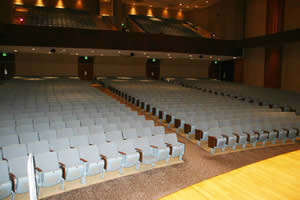

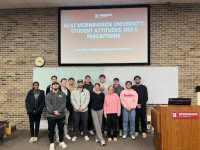


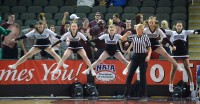
Leave a Reply